Initiatives for Product Quality Improvement
Kawasaki undertakes a variety of approaches to extend high-performance, high-quality products to customers around the world.
Plant & Infrastructure Company
Tackling big projects overseas
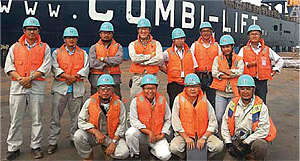
Hiroaki Fujino
(back row, fourth from the left) at an Indonesian Fabrication Vendor Manager, Section 1, Quality Assurance Department Plant & Infrastructure Company
The Plant & Infrastructure Company has a wide range of
products such as industrial plants (Cement / Chemical),
LNG plants, power plants and incineration plants and
others. Most of these products share a noteworthy
characteristic in that they are completely built-to-order.
A prime example would be LNG tanks. With automatic
welding and improved pressing methods at Kawasaki’s Harima
Works, we are able to realize high quality at reasonable
prices and have earned the trust of our customers.
Meanwhile, against the current background of
rising international energy demand, we are actively
developing a presence in overseas markets with
products in categories for which already cultivated
competitive strength in the domestic market. But the
overseas market environment is fiercely competitive,
fueled by a downward trend in prices, of course, as well
as the need for high-spec features and high-quality
performance. On large projects, the order amount
may be significant, but tiny mistakes can have a major
influence on how successful a project is overall, and
may draw into requiring the true value of integrated
engineering expertise.
- Project members strive for barrier-free communication and structure cutting laterally across divisions to ensure that projects proceed smoothly.
- The Plant & Infrastructure Company applies its own approach to front-end engineering, whichexhaustively identifies latent risks right fromestimate and design stages.
- We endeavor to enhance integrated engineering expertise through Company-wide training opportunities as well as our own education and training programs and a proactive use of on-the-job-training as a means for experienced employees to pass on acquired technical knowledge to their younger colleagues.
In addition, to meet rising quality requirements,
we constantly strive to enhance quality by
- sharing information on nonconformities that occurred in the past and building a database
- running a preliminary check to identify risks, visualizing possible actions and then tackling
- promoting standardization of technologies and
- improving the accuracy of production capability assessment at overseas vendors; and
- achieving greater efficiency in the manufacturing-related control methods used
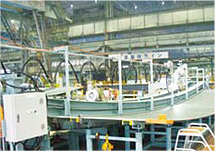
tank inner wall at Harima Works
Currently, we are working on the production of cryogenic tanks for the Ichthys Project Onshore LNG Facilities in Australia. Major components of the tanks, which are made of 9% nickel steel and cryogenic-use carbon steel, are being constructed at the Harima Works, but in a first for the Plant & Infrastructure Company, we outsourced production of the carbon-steel roof to an overseas vendor. For the roof structure connection, we opted for bolt construction rather than the conventional welded construction to reduce installation costs in Australia where labor costs are high. On the other hand, the need for accurate manufacturing of component parts is much higher than conventional construction, but experienced personnel at the Harima Works in cooperation with experienced personnel of overseas project achieved the quality of parts produced outside Japan as good as that of parts produced in Japan.
Going forward, international competition is bound to intensify due to the rise of emerging economies. The Plant & Infrastructure Company will strive to improve quality still further and draw on integrated engineering expertise to provide internationally competitive products to customers around the world.
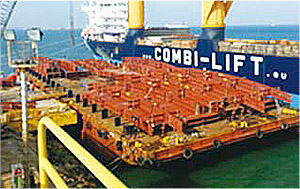
Indonesian vendor is loaded for journey to project site in Australia
Motorcycle & Engine Company
Continuous and Horizontal Quality Assurance Activity
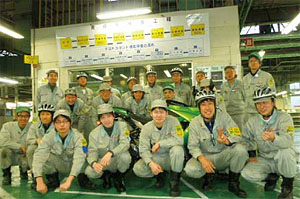
Takeo Tsubonouchi (upper left)
Manager, Quality Control Section, QA Admiistration Department,
Quality Assurance Division, Motorcycle & Engine Company
Our company is the only division within Kawasaki that delivers goods directly to consumers.
We manufacture and deliver to world markets a wide range of products including motorcycles, all-terrain vehicles (ATVs), recreation utility vehicles (RUVs), utility vehicles, Jet Ski personal watercraft, and general-purpose gasoline engines. Of these products, the Ninja series and Z series in particular are loved by riders around the world and have become a byword for Kawasaki motorcycles. In 2013, we released new models for 2013, the Ninja ZX-6R, Ninja 300, and Ninja 250 and the Z800 and Z250, assembling a wide-ranging product lineup that has enjoyed popular acclaim.
To continuously raise brand strength by delivering attractive products and services that inspire customer confidence and satisfaction, we need to not only assemble a comprehensive product lineup but also manufacture all products to an excellent level of quality.
In the development process, comprehensive quality checks are carried out at intermediate stages by relevant divisions. If a set quality level is not reached at internal design review meetings, the product is not allowed to proceed to the next stage. This system guarantees quality in the models we develop.
Meanwhile, our manufacturing divisions continue to work hard maintaining and improving quality through continuous quality improvement activity and carry out a stringent quality inspection of each unit on final inspection area at mass production lines, ensuring the quality of the products we deliver to customers.
Quality assurance activity is not a task limited to our company, however, but also needs to embrace our suppliers. Of the parts used in our products, the essential items are manufactured in-house, but a large number of other component parts are sourced from suppliers. Cooperation by both parties in activities to maintain and improve product quality is therefore another important aspect of quality assurance activity.
In addition, after a sale is completed, we continue to constantly gather information and suggestions from sales bases at the market frontline and from customers. We use the information we obtain in product development and quality improvement.
Today, our procurement and production activity is rapidly globalizing, and we therefore need to approach related quality assurance activities from a global angle. The quality assurance activity that has underpinned Japanese manufacturing is evolving to a still higher level.
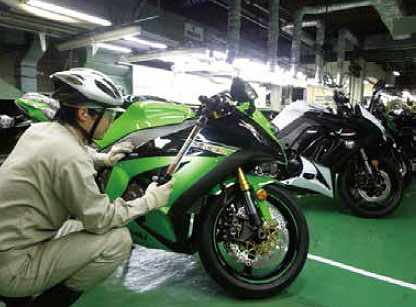
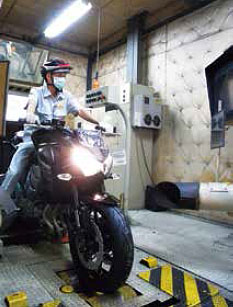
(Kawasaki Motors Enterprise (Thailand) Co.,Ltd.)
Ship and Offshore Structure Company
The Ship and Offshore Structure Company, the business segment that quite literally launched Kawasaki, has delivered more than a thousand ships. Here we highlight efforts to improve product quality by capitalizing on the many opportunities we have to interact with customers in the building of ships and the face-to-face relationships that are formed as the process unfolds.
1. Development, contract
We accurately identify customer needs and determine ship specifications through numerous meetings.
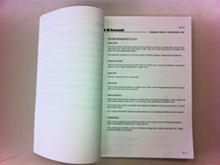
2. Design
Even at the design stage, we frequently hold technical meetings with customers and confirm requirements by obtaining approval of drawings while putting forward reliable designs conforming to technical standards.
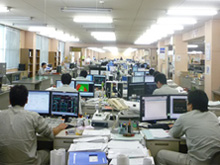
3. Procurement
We order equipment and components from more than a hundred suppliers. We accompany customers to suppliers' shop test of critical equipment and confirm that the products meet the required specifications.
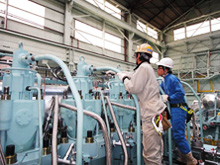
4. Manufacturing, inspection
At the shipyard, the ship takes form over multiple stages, such as steel plate fabrication, welding, painting and installation of equipment. Customers dispatch supervisors to track progress and together we ensure quality through various inspections.
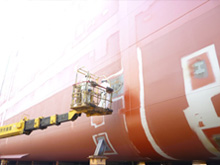
5. Sea trial, delivery
In the final stage of shipbuilding, the ship is actually put to sea and we, along with our customers, confirm performance. Later, the ship leaves the shipyard quay to ply the world’s oceans, marking delivery to the customer.
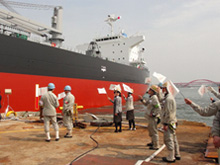
6. After-sales services
We take account of post-delivery customer feedback and quickly extend technical support to customers requiring repairs or supply of components. The information obtained through such activities is valuable and feedback to each department to improve quality.
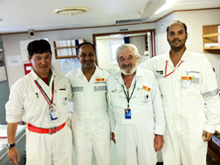
Precision Machinery Company
The Precision Machinery Company manufactures hydraulic machinery and units responsible for motion control in various machines. Of the products made by this internal company, machinery for use in construction equipment, such as hydraulic shovels, have captured a large share of the market and have earned a solid reputation for quality and reliability. While small in size, our products are used at high speed and under high pressure, and their dependability under such conditions is the result of sophisticated design and processing technologies as well as persistent quality control at every stage of production. Indeed, this is an amalgamation of multiple technologies, from design through to production.
Some products made in Japan are also made abroad, at four locations, and the Company promotes diverse activities to ensure that all the machinery and components it provides are of the highest quality wherever in the world its customers may be.
1. Product Planning/Design
New products go through an exhaustive verification process by the sections involved in product development at every stage of development, in accordance with in-house design review tools. In addition, respective engineering sections jointly pursue component research with the Corporate Technology Division, which provides R&D assistance to internal companies, yielding successful results.
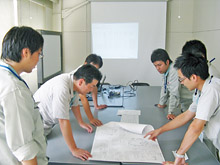
2. Product Evaluation
Products are evaluated under a variety of conditions at the engineering plant, which features 30 performance/durability test stands inside soundproof rooms, anechoic chambers, ultralow-temperature rooms and other facilities.
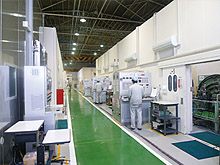
3. Parts Procurement
The internal company continuously implements activities, such as quality workshops, where participants learn by studying mistakes that have occurred in the procurement process. Participating suppliers also have a high awareness of quality, and joining them in such activities is definitely a benefit for the Precision Machinery Company.
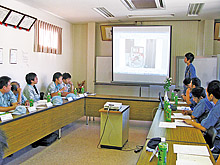
4. Parts Processing/Heat Treatment
The core parts of hydraulic machinery are made at factories in Japan where operations are tightly controlled. Human error is eliminated through automated processing, measurement, assessment and data entry.
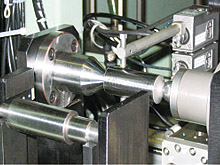
5. Assembly/Inspection
Equipment and facilities, such as work support systems, are incorporated all through assembly operations to prevent human error. The same preventative measures have been implemented at production points at home and abroad.
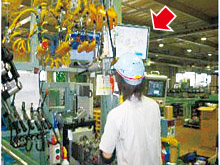
6. After-Service
If a quality issue appears, it is swiftly addressed and measures are put in place to prevent a recurrence. Quality status is always presented and discussed at quality meetings, and top management supports activities transcending department borders to ensure an all-around approach to quality.
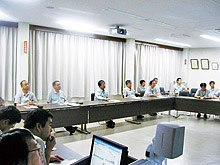
Contact
If you need more information about our business,
please feel free to contact us.





